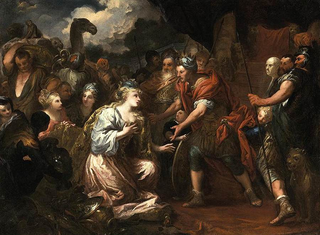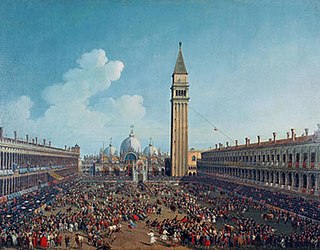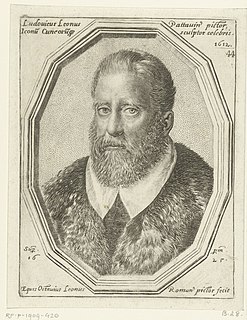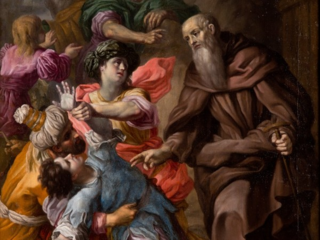Related Research Articles

Giovanni Francesco Barbieri, better known as Guercino, or il Guercino[ɡwerˈtʃiːno], was an Italian Baroque painter and draftsman from Cento in the Emilia region, who was active in Rome and Bologna. The vigorous naturalism of his early manner contrasts with the classical equilibrium of his later works. His many drawings are noted for their luminosity and lively style.

Guido Reni was an Italian painter of the Baroque period, although his works showed a classical manner, similar to Simon Vouet, Nicolas Poussin, and Philippe de Champaigne. He painted primarily religious works, but also mythological and allegorical subjects. Active in Rome, Naples, and his native Bologna, he became the dominant figure in the Bolognese School that emerged under the influence of the Carracci.

Francesco Vanni was an Italian painter, draughtsman, printmaker, publisher and printer active in Rome and his native city of Siena.

Antonio Visentini was an Italian architectural designer, painter and engraver, known for his architectural fantasies and capricci, the author of treatises on perspective and a professor at the Venetian Academy.

Domenico Maria Canuti was an Italian painter of the Baroque period, active mainly in Bologna and Rome. He was a major painter of fresco decorations. His ceiling decorations showed a mix of Bolognese and Roman influences.

Francesco Cairo, also known as Francesco del Cairo, was an Italian Baroque painter active in Lombardy and Piedmont.
Giovanni Gioseffo dal Sole was an Italian painter and engraver from Bologna, active in the late-Baroque period. Upon the death of Carlo Cignani, Gioseffo dal Sole became among the most prominent painters in Bologna, described as the Guido Moderno.

Giacinto Brandi was an Italian painter from the Baroque era, active mainly in Rome and Naples.

Pietro Dandini was an Italian painter of the Baroque period, active mainly in Florence.

Giovanni Battista Cimaroli (1687–1771) was an Italian painter of rustic landscapes with farms, villas and graceful figures and capricci of ruins and views of towns in the Veneto.

Lodovico Leoni was an Italian painter of the Renaissance period, mainly active in Rome. He was also a medallist, and coin-engraver. Other sources cite his name as Luigi Leone
Ottavio Semini was an Italian painter of the late-Renaissance.
Antonio Calegari was an Italian classical composer. His oratorio La risurrezione di Lazzaro 1779, was recorded under Filippo Maria Bressan in 2000.

Giovanni Battista Sassi was an Italian painter, active mainly in Milan and other areas of Lombardy, who painted in a late-Baroque or Rococo style.

Pietro Maggi was an Italian painter of the late-Baroque period.
Gesualdo Francesco Ferri was an Italian painter, active mainly in Florence.
Pietro Francesco Prina was born in Naovara and was an Italian engraver, active in Milan. He trained with Marc Antonio Franceschini in Bologna. He engraved history and capricci.
Giulio Coralli was an Italian painter of the Baroque period, active in Emilia-Romagna. He was a pupil first of Guercino, and then in Milan of Francesco Cairo. He was known for his portraits.

Giuseppe Zanata (1643–1720) was an Italian painter of the Baroque period, active mainly in Lombardy.

Fortunato Pasquetti (1690–1773) was an Italian painter of the Rococo period. He is known for his formal portraits of royalty and Venetian Patriciate. He was born in Venice and died in Portogruaro. He trained under Niccolò Cassana. He painted a portrait of Charles VI, Holy Roman Emperor.
References
- ↑ L'Abecedario pittorico dall autore ristampato corretto et accresciuto di ..., by Pellegrino Antonio Orlandi, page 149.
- ↑ Supplemento alla Serie dei trecento elogi e ritratti degli uomini i più illustri in Pittura , Scultura, e Architettura. by Pellegrino Antonio Orlandi, published by Stamperia Allegrini, Pisoni, e comp, Florence (1776); column 664.